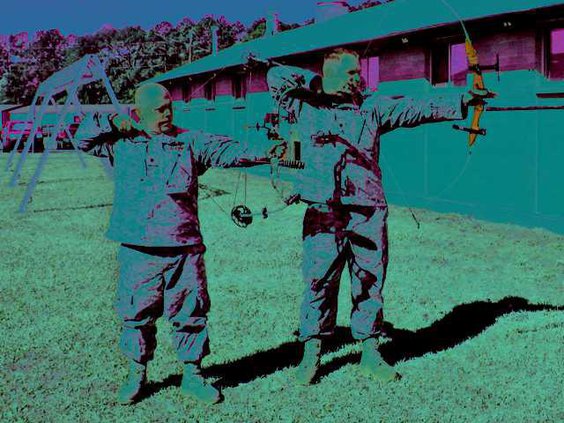Two young soldiers from Fort Stewart’s Warrior Transition Battalion selected to compete in the second annual Warrior Games May 16-21 in Colorado Springs, Colo., are focused on winning, not their injuries.
Army specialists Zachariah Smith, 23, and Stuart Lancaster, 28, will be among 200 wounded, injured and ill active duty service men and women from the Army, Air Force, Navy, Marines and Coast Guard competing in such events as adaptive archery, cycling, basketball, shooting, swimming, track and field and volleyball. Events will be held at the U.S. Olympic Training Center, the United States Air Force Academy, Memorial Park and Fort Carson, according to www.usparalympics.org.
“Our motivation level is through the roof right now,” Smith said. “We didn’t realize what a big deal this was turning out to be.”
The games are organized by the U.S. Paralympics, a division of the U.S. Olympic Committee, the Department of Defense and the USO. The USOC paralympic military program provides support and mentoring to American service men and women, conducting adaptive-sports training and games. Coaches and athletes from the U.S. Paralympics visited Fort Stewart’s wounded warriors in February.
Smith said the new adaptive-sports program at the battalion has helped him regain a competitive edge, and heal emotionally as well as physically.
“Now I’m about 98 percent healed,” he said. “Instead of having to do physical therapy, I do (adaptive sports).”
Smith was injured in an IED blast in 2007 when deployed to Iraq with the 2nd Heavy Brigade Combat Team. He suffered 12 separated disks in his spine, a broken knee, a broken shoulder, traumatic brain injury and PTSD.
“I was a little paralyzed for a while,” Smith said. “For about two years I couldn’t do anything.”
Smith will compete in sitting volleyball and compound archery. He played football and wrestled in high school, and added getting back into sports “wound up feeling pretty good.”
Smith also said he never thought he’d play volleyball and stressed sitting volleyball is “a lot harder than it looks.”
Smith recently competed in a sitting volleyball tournament in San Antonio, Texas, he said.
The Virginia Beach, Va., native is married to Katrina Smith. The couple is expecting their first baby in June.
Smith’s fellow athlete, Lancaster, came to the WTB after being diagnosed with Hodgkin lymphoma in 2009. He was preparing to deploy with the 1st Heavy Brigade Combat Team to Iraq just four months before he got sick. Lancaster said he weighed 298 pounds when he started intensive chemotherapy treatments and before he received a stem cell transplant. He weighed only 221 pounds after finishing chemo.
“I couldn’t do for myself, I needed help to eat, dress … I slept like 18 hours a day,” Lancaster said.
Adaptive sports helped him recover and regain his strength, the Bakersfield, Calif., native said.
“I’ve been in remission for nine months,” Lancaster said. “Spc. Smith and I are both headed back to active duty.”
Lancaster will return to the 1st brigade and Smith is waiting to hear what his new job and assignment in the Army will be.
WTB chief occupational therapist Debra DeHart said in addition to adaptive sports, wounded warriors participate in TRX suspension training, like their able-body counterparts. She said the battalion has acquired more adaptive-sports equipment, including hand cycles, archery sets, wheelchairs for wheelchair basketball and air rifles and pistols, and they recently hired a physical therapist. The battalion also offers an adaptive martial arts program, she said.
DeHart said the battalion also emphasizes training its leaders to understand what wounded warriors are experiencing and teaches them new ways of encouraging injured soldiers to get involved in fitness activities.
Lt. Col. Bill Reitemeyer, who helped develop the unit’s adaptive-sports program, will attend the Warrior Games next month. “Even on the most modest level, if you can add a goal to (a physical activity) it becomes more interesting and purposeful,” Reitemeyer said.
He recalled a Marine who recently competed in a paralympic swim meet. The man had no legs, one arm and was blind, the commander said.
“The entire crowd went wild when he got in the pool,” Reitemeyer said. “Now, he came in dead last every time. But that didn’t matter. What they were doing was cheering the undaunted spirit. That’s what most (wounded) soldiers want; to be considered for the success they are.”
Stewart paralympians prep for adaptive games


Sign up for our e-newsletters